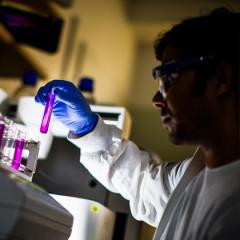 Patients at risk of life-threatening infections following chemotherapy could benefit from a new cell-based treatment developed from University of Queensland research.
Patients at risk of life-threatening infections following chemotherapy could benefit from a new cell-based treatment developed from University of Queensland research.
In the weeks following chemotherapy, a patient’s immune system is depleted as a result of neutropenia – a decrease in the number of circulating white blood cells or neutrophils – which leaves the patient vulnerable to potentially fatal infection.
UQ’s Australian Institute for Bioengineering and Nanotechnology’s (AIBN) Professor Lars Nielsen and his team have developed a method of producing a therapeutic dose of white blood cells in a typical transfusion bag which can be administered to patients immediately after chemotherapy.
Professor Nielsen said chemotherapy-induced neutropenia (CIN) is a life-threatening risk to cancer patients.
“It exposes them to infection and fever, which can lead to delays in treatment and reductions in chemo dose intensity,” he said.
“The treatment most commonly used for neutropenia involves an injection of granulocyte colony-stimulating factor (G-CSF) which stimulates the patient’s own stem cells to expand and differentiate into neutrophils.
“G-CSF’s effectiveness relies on the number of stem cells in the patient’s bone marrow, which is significantly reduced after chemotherapy, and it takes time for the stem cells to recover and mature into white blood cells.
“Our method instead avoids that ‘at risk’ period following treatment by extracting and separating stem cells from umbilical cord blood to produce a transfusion-ready therapeutic dose of white blood cells which can be administered to patients immediately after chemotherapy,” Professor Nielsen said.
The technology is based on research by UQ’s Professor Nielsen and Dr Emma Palfreyman, and Dr Nick Timmins, formerly of UQ and now based at CCRM - a Canadian leader in developing and commercialising regenerative medicine technologies and cell and gene therapies.
It will now progress towards the clinic following a licensing deal with CCRM, negotiated by UQ commercialisation company UniQuest.
UniQuest CEO Dr Dean Moss said CCRM was the ideal partner to take the neutrophil technology towards the market.
“CCRM has demonstrated experience in fundamental stem cell science and the commercialisation of regenerative medicine and we are delighted that they will take UQ’s research towards the clinic so that it can benefit patients,” Dr Moss said.
CCRM President and CEO, Dr Michael May, said the centre is excited about the agreement with UQ and UniQuest.
“By combining the technology licensed from UQ with CCRM’s expertise and capabilities in the commercialisation of stem cell therapies, we believe we can provide a solution to this unmet clinical need and make a real difference to chemotherapy patients,” Dr May said.
The neutrophil research at UQ has been supported since 2003 by Stem Cells Australia and its forerunner, the Australian Stem Cell Centre, as well as the Australian Red Cross Blood Service and the Australian Research Council.
Media: communications@aibn.uq.edu.au; Professor Lars Nielsen, +61 7 3346 3986, lars.nielsen@uq.edu.au.


